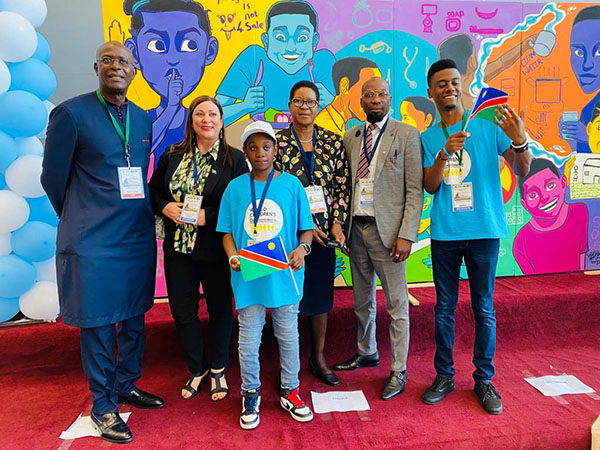Paheja Siririka
African presidents must work closely with children to address key issues that may be affecting them, says Children’s Parliament of Namibia Health Committee chairperson Rivaldo Kavanga.
He singled out climate change as one of the many issues affecting children worldwide, saying: “We propose to our leaders to not manage the world for us but manage the world with us”.
“Climate change denies children the right to go to school, it denies children the right to safety and protection and it denies children the right to clean running water, food, and shelter,” said Kavanga whilst addressing a high-level delegation of four country presidents at the celebration of World Children’s Day in Lusaka, Zambia recently.
He was part of more than 500 children from Botswana, Namibia, Zambia and Zimbabwe gathered in Lusaka on 20 November to mark World Children’s Day.
They shared their views on key issues affecting their lives with the presidents of Botswana Mokgweetsi Masisi, Zambia’s Hakainde Hichilema, Zimbabwe’s Emmerson Mnangagwa and the Vice President of Namibia Nangolo Mbumba.
Under the theme ‘A Better Future for Every Child’, the event presented a unique opportunity to foster dialogue between children and the highest representatives of the four countries involved.
This year’s celebration was built on the momentum created during the 2021 World Children’s Day at the Kazungula Bridge in Kasane, Botswana, which brought together the same leaders, including Namibian President Hage Geingob, and over 100 children. At this event, a commitment was made to promote and protect children’s rights in their countries.
“It was indeed an event full of hope and determination as reflected in the children’s messages and creative art. Namibia has talented children whom we should continue nurturing and investing in; truly inspired to be working with these children,” said Rachel Odede, Unicef representative.
The four sitting presidents were part of an interactive panel discussion with children in which they shared their experiences, challenges, and possible solutions. Among others, children expressed that more needs to be done to accommodate children with disabilities in society, including schools, public transport, clinics, and extra-curricular activities.



